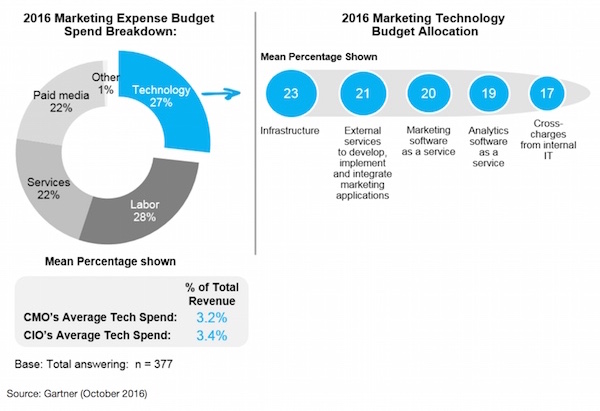
Looking for the latest data on enterprise marketing technology spend? Look no further.
Gartner recently released their CMO Spend Survey 2016-2017. It’s already been in the news because their report showed that marketing budgets climbed for another consecutive year, now up to 12% of total company revenue.
It’s also received due fanfare because it shows that Gartner’s once flabbergasting prediction from back in 2012 — that by 2017 CMOs would spend more on technology than CIOs — is on track to be proven true.
According to their report, on average CMOs now allocate 27% of their budget towards technology. Doing the math, a 27% share of 12% of total company revenue is 3.2% that is allocated towards marketing’s technology budget. In comparison, on average, the CIO only spends 3.4% of the company’s total revenue on technology.
They’re almost neck-and-neck in technology spend. And with marketing’s annual growth rate for tech spending at 12% — in contrast to a 3.1% growth rate for IT — it’s fairly certain that marketing will indeed exceed IT in this regard in 2017.
It’s worth noting that Gartner only surveyed enterprises (n=375) with at least $250 million in annual revenue. But in many ways, that makes these figures even more impressive. Large companies must fight tremendous inertia to embrace a revolution. And the rapid rise of marketing’s technology leadership over the past 5 years — in many applications eclipsing traditional IT — is nothing short of revolutionary.
Let’s look at the breakdown of marketing’s technology spend:
- 23% for infrastruture, which includes servers, storage and cloud computing resources (i.e., infrastructure-as-a-service)
- 21% for external services to develop, implement, and integrate marketing applications
- 20% for marketing software-as-a-service applications
- 19% for analytics software-as-a-service applications
- 17% for cross charges from internal IT
Note that this doesn’t include the cost of internal marketing staff associated with these technologies, such as marketing technologists, marketing operations teams, and marketing analytics personnel. That’s part of the 28% of the marketing budget that goes to labor, the largest share of the pie.
Combining the marketing and analytics software-as-a-service applications figures shows that the largest part of marketing’s technology budget (49%) goes to SaaS.
It’s also interesting to note that marketing’s charges for infrastructure, according to Gartner, “represents a departure from the historical notion of infrastructure as a capital expense, reflecting the impact of infrastructure-as-a-service (IaaS) on marketing’s independence from capital IT budgets.”
As for the implications of this, I’ll close with this quote from their report (emphasis added):
“What does this mean for marketing leaders? Marketing is now also responsible for critical customer-facing, revenue-generating systems and applications. It means that, if they haven’t already, they ought to appoint a chief marketing technologist in title or role equivalent to look after this growing technology estate. And, crucially, it means marketing has a responsibility to collaborate with enterprise IT, ensuring coordinated, efficient, and harmonized technology spending on behalf of the business.”



